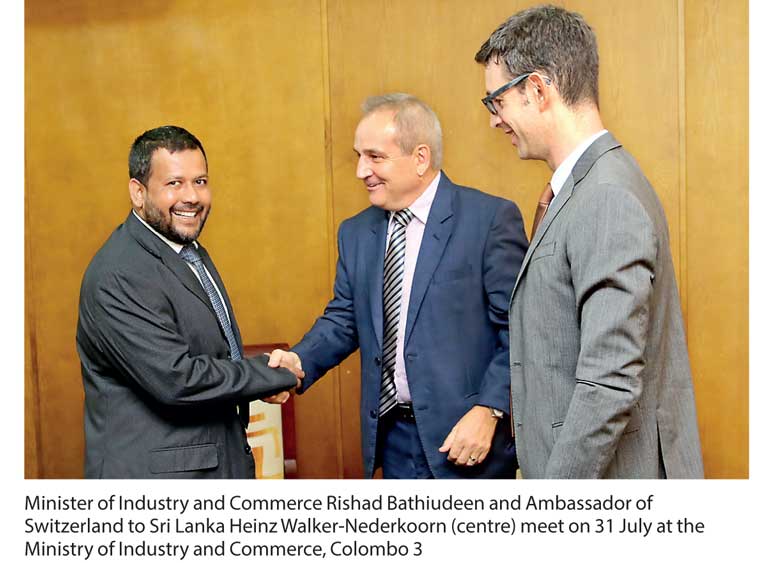Saturday Feb 21, 2026
Saturday Feb 21, 2026
Wednesday, 9 August 2017 00:00 - - {{hitsCtrl.values.hits}}

As bilateral trade recorded a huge 65% surge, the non-EU but central European nation Switzerland has called Sri Lanka to get on board its historic GSP facility and boost Lankan exports to Swiss market further. Meanwhile, UNCTAD says that a vast array of products from Sri Lanka including apparels, can enter the Swiss market at virtually zero tariff using the Swiss GSP stream.
“Sri Lankan exporters should strive to exploit this facility,” voiced Ambassador of Switzerland to Colombo Heinz Walker-Nederkoorn on 31 July. Ambassador Walker-Nederkoorn was meeting Minister of Industry and Commerce Rishad Bathiudeen at the Ministry of Industry and Commerce, Colombo 3.
“Bilateral trade between Sri Lanka and Switzerland shows a strong short term growth. Still that could be way below real potentials,” said Walker-Nederkoorn and added: “Switzerland is a central European country but is not part of European Union. Still, our own Swiss GSP was implemented in 1971. Sri Lanka is still a beneficiary of a pioneering GSP facility that came in to being at the same time as the EU GSP. Sri Lankan exporters should strive to exploit this facility. Switzerland’s economy has a well-developed service sector such as financial services. Still, Switzerland can take in merchandise products and there is a demand. Exploiting our GSP can help boost your exports and also increase total bilateral trade. Swiss manufacturing industry specialises in high-technology and production.”
According to United Nations Conference on Trade and Development (UNCTAD)’s the Division of International Trade in Goods and Services and Commodities, the Swiss GSP facility that began in 1971, allows many Sri Lankan products to be exported totally tariff free to the Swiss market. Among them are Sri Lankan apparels and textiles (except HS 5001-5003, 5101, 5103, 5201-5203, 5301-5305, and 6310), coconuts and desiccated coconuts, footwear, headgear, electrical machinery, certain fruits tropical fruits and spices, live ornamental fish, certain types of freshwater fish, types of cut flowers and foliages, tomatoes, onions and garlic, cabbages and cauliflower, types of beans, sweet corn, chick peas and kidney beans, ginger, and even mustard and turmeric.
Bathiudeen, responding to Walker-Nederkoorn agreed that present bilateral trade is far below its real potential. “I am given to understand that the Swiss GSP was implemented in 1971 at the same time as EU GSP and Sri Lanka too was a pioneering beneficiary of it. Last year our annual trade increased by a very strong 65%. Therefore this is a good time to look at how Lankan exporters can use the Swiss GSP facility. Though Sri Lanka – Swiss bilateral trade is on a growing trend, there are vast unexplored potentials and the GSP facility can help us to overcome them. According to the Department of Commerce, in 2016 our total export to Switzerland was $ 102.23 million. Interestingly, electronic machinery and electrical controls have been the main items of Lankan exports to Switzerland last year–around 44 % of our total exports. By using the Swiss GSP, we can expand our export basket with other products including foods, fruits and vegetables as well.”
According to the Department of Commerce, overall bilateral trade between Switzerland and Sri Lanka leaped by 65% to $ 377 million in 2016 (from 2015’s $ 229 m). Sri Lanka’s exports to Switzerland last year was around $ 102 million, mostly unchanged from 2015’s $ 101 million. 24% of Lankan exports to Switzerland last year was electronic equipment and another 19% was electrical controls. The third leading Lankan export to Switzerland was diamonds – 11% of total exports in 2016.
Among the well-known Swiss investments in Sri Lanka are Nestle, A Baur & Co, Holcim, and Kuehne & Nagel.
Both Minister Bathiudeen and Ambassador Walker-Nederkoorn also delved into other aspects of bilateral cooperation during their 31 July meeting in Colombo.